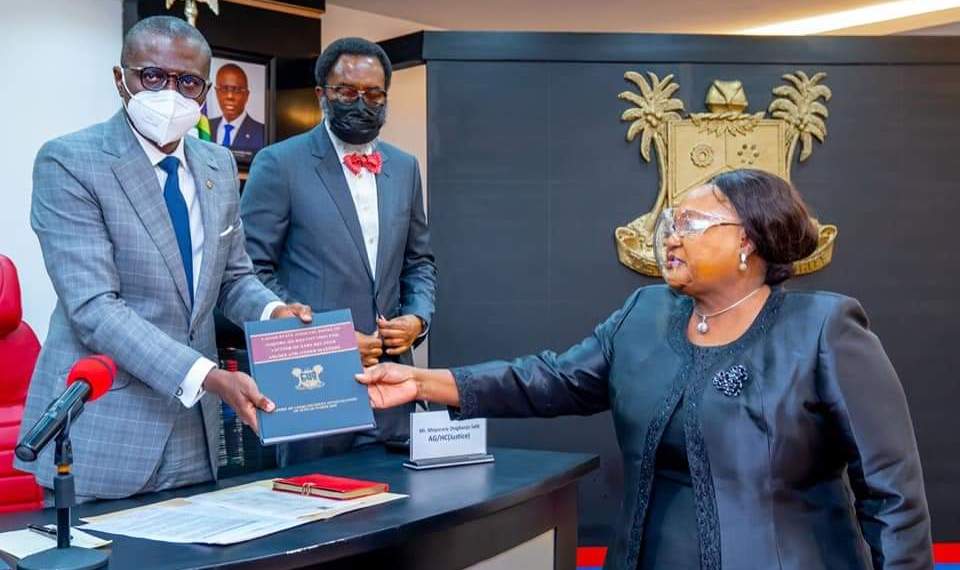News
#EndSARS White Paper: Lagos faults panel’s report

The Lagos State Government has faulted some parts of the report of the Judicial Panel of Inquiry (JPI) into the Lekki Incident Investigation on Oct. 20, 2020.
In its White Paper on the report of the JPI on the Lekki Incident Investigation, the state government faulted the findings by the Justice Doris Okuwobi-led panel that nine persons were killed by gunshots at the Lekki Toll Gate.
According to the government White paper, the report was full of discrepancies, irregularities and inaccuracies with claims of deaths of victims.
The government said that it rejected the claim in the findings of the JPI regarding the nine deaths at LTG on the basis of what it considered as fundamental inconsistencies.
It said that the report was rejected because the finding were clearly and manifestly not supported by evidences.
The government said that the evidence of the Pathologist, Prof. John Obafunwa, had said that only three of the bodies they conducted post mortem examination on were from Lekki and only one had gun shot injury.
The state government said that this was not debunked, hence, it was deemed credible, as the contrary was not presented before the panel.
The government, in its White Paper further posited that, “This finding of nine deaths at Lekki Toll Gate on Oct. 20 was even more baffling, because apart from listing out their names in that form at pages 297-298, the JPI offered no explanation regarding circumstances of their death.
”The names simply sprang up at pages 297-298 of the report without any justification.
”It is quite astonishing that in the list of 11 deaths set at pages 297-298, two of the names appeared twice (Kolade Salam, Folorunsho Olabisi as Nos. 37 and 38).
”Furthermore, the person listed, as No. 46 Nathaniel Solomon, who testified as a witness and petitioned the JPI in respect of his brother who he alleged died at LTG, himself listed as having died at LTG on 20th October 2020.
”Remarkably, Nathaniel Solomon’s deceased brother (Abata Soloma), was then also listed as No. 2 on the list of persons who died at LTG.
‘’The only victim of gunshot injury from LTG was picked up at 7:43, on 21th October 2020 after the curfew commenced (see page 99). Furthermore, there-was no-shred of evidence regarding who shot him,” the government said.
The state government, in the White Paper, further pointed out that another substantial inconsistency in the JPI Report was the award of compensation to only one out of the alleged nine, listed as “deceased”.
According to the government, this shows that the Judicial Panel of Inquiry (JPI) has doubts as to the death of eight other allegedly deceased persons on its list.
”The JPI also surprisingly awarded the sum of N10 million to one Serah Ibrahim (listed as No. 14 on page 304 of the report). Serah Ibrahim was neither a petitioner nor a claimant before the JPI.
”At Page 179 of the report, Serah Ibrahim testified on oath that she did not have any petition before the Panel; neither did she have any claims for compensation.
”This award to Serah Ibrahim is also contrary to the provisions of Section 13 Tribunal of Inquiry Law 2015 (Cap. T6 Law of Lagos State), which prescribes that only witnesses summoned by a Tribunal of Inquiry are entitled to witness fees subject to consent of the Attorney General. Serah Ibrahim did not testify at the request or summons of the Tribunal,” it noted.
On some other recommendations, Lagos State Government said it has no control over the internal affairs of the Nigeria Police Force, adding that the recommendation would therefore, be forwarded to the appropriate authorities, namely, the Federal Government of Nigeria, the National Economic Council, Police Service Commission and Nigeria Police Force.
It also said that it would set up a separate statewide Helpline for human rights abuses, in addition to its existing Emergency Toll-Free (767 and 112) Helplines, assuring that the recommendation would also be forwarded to the National Economic Council.
On the other report bordering on police brutality, the government said that out of the 22 recommendations, it would only accept four and would forward 18 recommendations to the Federal Government.
It added that out of the 18, three recommendations overlap, which it had also accepted.
The government however, said that it lacked the powers to investigate and fish out police officers as recommended by the JPI at pages 249-254 of the report.




 Davido's Net Worth & Lifestyle
Davido's Net Worth & Lifestyle 
